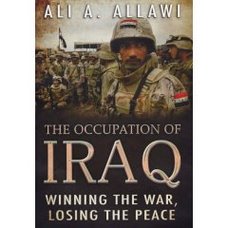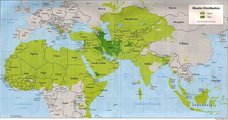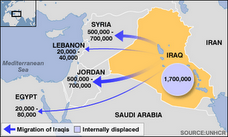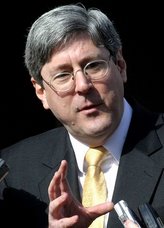AS EXCERPTED BY SLOGGER
GEN. POWELL: (Iraq) is an extremely difficult situation. I have characterized it as a civil war even though the administration does not call it that. And the reason I call it a civil war is I think that allows you to see clearly what we’re facing. We’re facing groups that are now fighting each other: Sunnis vs. Shias, Shias vs. Shias, Sunni vs. al-Qaeda. And it is a civil war.
The current strategy to deal with it, called a surge—the military surge, our part of the surge under General Petraeus—the only thing it can do is put a heavier lid on this boiling pot of civil war stew. That’s only one part of the overall surge. The other two parts of the surge, building up Iraqi forces, military and police forces, so that they can take over responsibility for security and getting the Iraqi political leadership to understate—undertake reconciliation efforts and to do something to turn out the fire.
....But if, at the end of the day, when this civil war resolves itself, as every civil war eventually does resolve itself, one way or the other, and we see a government emerge that does represent the interests of its people, then maybe that’s the best success we can hope for, even though it might not be a government that looks exactly like, you know, a government we have—would have designed back here in Washington, D.C., or we would have designed in Philadelphia based on Jeffersonian principles. And so it’s a tough road ahead, but increasingly the burden has to rest on the Iraqis and not on the American troops.
....If we knew today—or knew then what we know today, that there were no weapons of mass destruction, I would’ve had nothing to take to the United Nations. The national intelligence estimate, which was the basis of my presentation and, by the way, was the basis of the intimation that was given to the Congress that caused them to vote a resolution of support four months before my UN presentation, we rested our case on the existence of weapons of mass destruction that were a threat to us and could be given to terrorists, making it another kind of threat to us.
I think without that weapons of mass destruction case, the justification would not have been there, even though Hussein was a terrible person, human rights abuses abounded, he was cheating on the UN food, Oil for Food program. But I think it is doubtful that without the weapons of mass destruction case, the president and Congress and the United Nations and those who joined us in the conflict—the British, the Italians, the Spanish, the Australians—would’ve found a persuasive enough case to support a decision to go to war.
*****
I never used terms such as cakewalk, and I never had any illusions about this being simply a stroll into Baghdad and then everything was going to be wonderful. But let’s go back to around 10 April of 2003. Saddam Hussein’s statue fell on the 9th, and from the 10th of April, for a month or two, everybody in the United States thought this was a terrific outcome. And it looked like it was going to work, just as the administration has said it was going to work.
We were liberators for a moment, and then we simply did not handle the aftermath. We didn’t realize we were in an insurgency when we were in an insurgency, and we watched as the ministries that we were counting on, the government ministries we were counting on to help us take over, were being burned and looted. And we didn’t respond. And we didn’t have enough troops in the ground. That’s my judgment, not the judgment of military commanders at the time, but it’s certainly my judgment, and we didn’t have enough troops on the ground.
Because once the government fell, the whole structure of government collapsed. Once the government in Baghdad came down, everything came down. And it was our responsibility then, under international law as the occupying authority as well as the liberators, to be responsible for restoring order, and we didn’t have enough troops there to restore that order nor did we have the political understanding of our obligation to restore that order.
*****
I was part of an administration that, over a period of years, had created a body of evidence and intelligence that said this is a dangerous regime. And I had no love for Saddam Hussein, as you can appreciate. For 12 years I’d been listening to, “Well, why didn’t you take him out back in 1991?” So I had no truck with this regime, and we had a steady stream of intelligence reports that suggested he was a danger.
And he became more of a danger after 9/11 when the possibility emerges that some of these terrible weapons he was working on—and let there be no doubt that he was continuing to work on these. He was continuing to hope that he could escape the boundaries of the UN sanctions and get back to making these kinds of weapons. And if you believe otherwise, I think that would be a naive belief. And so, throughout that time, we had this consistent body of evidence.
And when the president called me in and said, “I want you to go to the United Nations and make the presentation,” I didn’t blink in the slightest because I had been using that intelligence all along in my presentations and had every reason to believe it.
The problem we had in the next five days was that a product was being worked on in the White House and the NSC which was unusable. It was more a legal brief than it was an analysis.
I would’ve preferred no war because I couldn’t see clearly the unintended consequences. But we tried to avoid that war with the UN sanctions and putting increasing diplomatic and international pressure on Saddam Hussein. But when I took it to the president and said, “This is a war we ought to see if we can avoid,” I also said and made it clear to him, “If, at the end of the day, it is a war that we cannot avoid, I’ll be with you all the way.” That’s, that’s part of being part of a team. And therefore I couldn’t have any other outcome, and I had no reservations about supporting the president in war.
And I think things could’ve turned out differently after the middle of April if we had responded in a different way.
Monday, June 11, 2007
Subscribe to:
Post Comments (Atom)





No comments:
Post a Comment